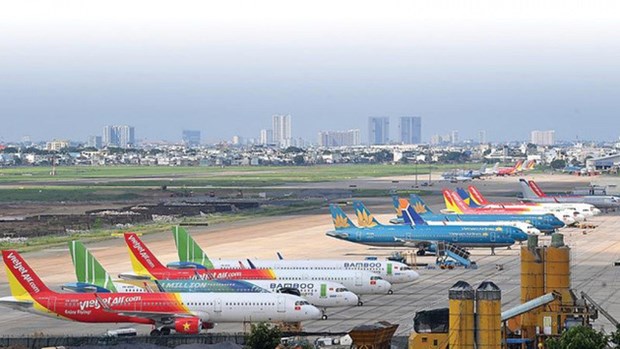Viet Nam to resume nine regular international air routes
Regular international flights from/to Viet Nam will be resumed in two phases, with air travel with nine foreign destinations to be available again in the first phase and fifteen in the second phase, according to the latest scenario developed by the Civil Aviation Authority of Viet Nam (CAAV).
 |
| Regular international flights from/to Viet Nam will be resumed in two phases, with air travel with nine foreign destinations to be available again in the first phase and fifteen in the second phase, according to the latest scenario developed by the Civil Aviation Authority of Viet Nam (CAAV). (Photo: baodautu.vn) |
It is the third scenario developed by the CAAV for the resumption of international flights from/to Viet Nam, CAAV Deputy Director Vo Huy Cuong said on December 16.
Under the new plan, Viet Nam will restore regular international air routes with Beijing/Guangxi (China), Tokyo (Japan), Seoul (the Republic of Korea), Taipei (Taiwan, China), Bangkok (Thailand), Singapore, Vientiane (Laos), Phnom Penh (Cambodia), and San Francisco/Los Angeles (the US).
The reopening of regular international flights is expected to fuel travel demand from these destinations to Viet Nam, Cuong said, adding that people will be able to travel normally to Viet Nam without having to transit through other destinations.
During the second phase, flights will be likely to reconnect Viet Nam with six more other foreign destinations, including Kuala Lumpur (Malaysia), Hong Kong (China), Paris (France), Frankfurt (Germany), Sydney (Australia) and Moscow (Russia).
Concerned authorities will evaluate the implementation of the plan before allowing regular international flights to resume to pre-pandemic level, he stressed.
According to a new guidance issued by the Ministry of Health on the same day, fully vaccinated foreign arrivals with negative COVID-19 test results will only need to self-quarantine at home or places of accommodation for three days upon entry into Viet Nam by air.
The new regulations will be effective from January 1, 2022, the day Vietnam is set to resume regular international flights on a pilot basis.
The arrivals must have proof of negative COVID-19 test results (using the gold-standard PCR method) within 72 hours prior to entry (except in the case of children under two years old), must declare their health status before entry and must install Viet Nam’s PC-COVID app (available on both Android and iOS) for contact tracing and medical declaration purposes.
Arrivals that are Vietnamese citizens, including Vietnamese citizens residing overseas and the spouses and children of Vietnamese citizens, who have not been vaccinated against COVID-19, can be given free inoculation during the quarantine period if they agree.
Entrants who have been fully vaccinated or recovered from COVID-19, must not make direct contact with others nor leave their places of residence or designated accommodation (hotels, motels, resorts, offices, dormitories, guest houses, etc.) during the first three days.
Two RT-PCR tests will be conducted, on the first and third day since the date of entry.
If the results return negative, then the entrants still need to self-monitor their health status for 14 days after arrival, but this is already a huge step down from the current policies of mandatory seven days of concentrated quarantine and seven days of follow-up medical self-observation.
If they are willing to get a COVID-19 test (RT-PCR) on the tenth day, then the medical self-observation could end then.
For entrants who have not been fully vaccinated, upon entry, they will stay at home or place of accommodation for seven days, with RT-PCR tests conducted on the first and seventh day.
If the results are negative, the full two weeks of self-observation is applied, with another RT-PCR test to be done on the fourteenth day from the entry.
For entrants who are under 18 years old, above 65 years old, pregnant women, or having underlying health conditions (without requiring care or observation of medical facilities), they will be allowed to go into quarantine with their parents or caretakers.
The caretakers must be fully vaccinated or have recovered from COVID-19 and sign a ‘commitment’ document giving their voluntary willingness to quarantine with another person after having been informed of the risks of virus transmission. They will also be subject to the same stringent testing regimes and COVID-19 prevention and control measures expected of foreign arrivals.
Source: VNA